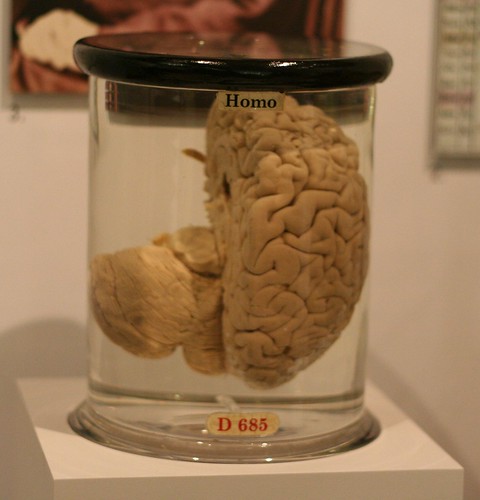Abnormal behavior, such as “punching yourself in the face,” may appear symptomatic of aggression but could actually stem from an unusual neurological impairment. Professing to taste colors or speaking in a foreign accent may lead to a referral to a psychiatrist but these behaviors can actually result from rare brain disorders, sometimes genetically acquired, but most often manifesting as a result of trauma or disease.
1. Synesthesia
[showmyads]Seeing sounds, tasting colors and hearing smells may sound like a drug-induced psychotic episode but if you’re a synesthete, these abilities manifest as a result of the neurological disorder synesthesia. In the United States, synesthesia may affect as many as 1 out of every 20,000 people. The majority of synesthetes (individuals who experience synesthesia) are female and left-hand dominant, with the disorder appearing to be genetically linked. Although researchers are still unclear about the neurological basis for synesthesia, most cases reveal cross-sensory connections within the brain.
Synesthesia manifests along several different sensory pathways, including hearing-induced vision which causes words and sounds to elicit visual responses. Synesthetes may also experience sensations of touch when hearing sounds or experience smells at the sight of an object. Numbers and names may also be represented by certain colors or smells. Musical notes or sequences of notes induce visions of fireworks, oscillating waves or colorful patterns.
A large number of confirmed synesthetes excel in the creative arts, such as Russian painter Wassily Kandinsky who heard colors, American jazz aficionado Duke Ellington who saw music notes in the form of color and renowned physicist Richard Feynman, whose complicated mathematical equations appeared color-coded.
2. Alien Hand Syndrome
When doctors severed Karen Byrne’s corpus collosum to alleviate her epilepsy symptoms, Karen began to manifest bizarre symptoms. Karen’s left hand seemed to take on a mind of its own and continuously struck her in the face against her own will. Karen reported that she felt demon-possessed and was frightened by her inability to stop her hand from striking. Her left hand exhibited other willful behavior that Karen was unable to control. “I’d light a cigarette, balance it on an ashtray, and then my left hand would reach forward and stub it out.”
Karen suffers from Alien Hand Syndrome, a rare brain disorder triggered by damage to the corpus collosum–a bundle of nerves that facilitates communication between the right and left hemispheres of the brain. When the corpus collosum is removed or made inactive, the hemispheres exhibit two distinct and separate types of consciousness. Other cases of Alien Hand Syndrome (also called Anarchic Syndrome) describe the errant hand taking the wheel in the opposite direction when driving (after the properly functioning hand has maneuvered the vehicle), grabbing hot objects and touching strangers inappropriately.
3. Foreign Accent Syndrome
Karen Butler, an American from Newport, Oregon, speaks with a British accent since waking up from oral surgery in 2009. She’s never been to the UK and has no control over her newly acquired accent. Butler’s condition is attributed to Foreign Accent Syndrome (FAS), a rare neurological disorder that manifests after brain injury from stroke or trauma. Several cases are also associated with severe and chronic migraine headache.
While most people affected by FAS go on to lead normal lives after initial adjustment to the disorder, some individuals suffer severe consequences. In 1941, a Norwegian woman was struck by shrapnel during an invasion by German forces. The injury caused a seizure disorder that replaced the woman’s native Norwegian accent with a German accent, which eventually left her ostracized from her community.
Lisa Fowler is a psychologist and guest author at Best Psychology Degrees.
References
Ivry, R. (2000). A review of synesthesia. Retrieved January 28, 2013 from http://hci.stanford.edu/jheer/files/2000-Synesthesia-Psych127.pdf
Ay, H., Buonanno, F. S., Price, B. H., Le, D. A. &Koroshetz, W. J. (1998). Sensory alien hand syndrome: Case report and review of the literature. Journal of Neurology, Neurosurgery and Psychiatry with Practical Neurology. Retrieved January 28, 2013 from http://jnnp.bmj.com/content/65/3/366.full
Bundick, T. & Spinella, M. (1999). Subjective experience, involuntary movement, and posterior alien hand syndrome. Journal of Neurology, Neurosurgery and Psychiatry with Practical Neurology. Retrieved January 28, 2013 from http://jnnp.bmj.com/content/68/1/83.full
Mark, V. W. (2007) Alien hand syndrome. Retrieved January 28, 2013 from http://www.jsmf.org/meetings/2008/may/Mark%20VW%202008%20Alien%20hand%20syndrome.pdf
Mosley, M. (2011, January 11). Alien Hand Syndrome sees woman attacked by her own hand. BBC. Retrieved January 28, 2013 from http://www.bbc.co.uk/news/uk-12225163
Abdollah, T. (2011, June 6). Foreign accent syndrome: Oregon woman develops foreign accent after surgery. Retrieved January 28, 2013 from http://phys.org/news/2011-06-oregon-woman-foreign-accent-surgery.html
Garst, D. & Katz, W. (2006, August 15). Foreign accent syndrome. The ASHA Leader. Retrieved January 28, 2011 from http://www.asha.org/Publications/leader/2006/060815/f060815c.htm
Kurowski, K. M., Blumstein, S. E. & Alexander, M. (1996). The foreign accent syndrome: A reconsideration. Brain and Language (54) 1-25. Retrieved January 28, 2013 from http://www.cog.brown.edu/~seb/papers/kurowski.pdf
Related articles
- What’s this thing called ‘Synesthesia’? (psychologytoday.com)
- Fisher-Price Synesthesia (neurocritic.blogspot.com)
- In Synesthesia, Learning And Memory May Play A Central Role (medicalnewstoday.com)


